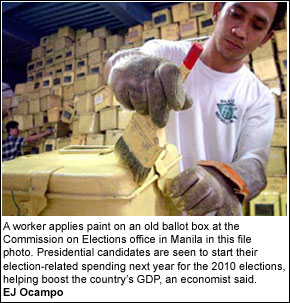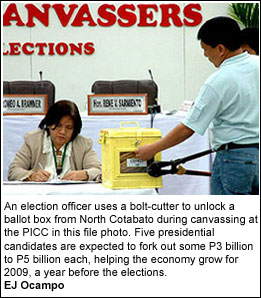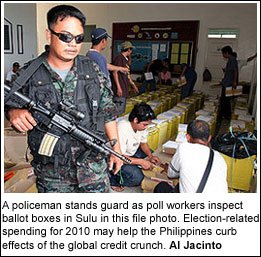MANILA, Philippines - Huge election spending by an estimated five presidential candidates starting next year is seen to cushion the Philippine economy from the global meltdown, an adviser of former president Fidel V. Ramos said on Tuesday. The economy is expected to grow between 3.8 percent and 4.5 percent for 2009 since five presidential contenders will be spending anywhere between P3 billion and P5 billion each to start their campaign, Bernardo Villegas, an economist at the University of Asia & the Pacific, said. His estimates fall within the government's target of 4.1 percent to 4.7 percent for next year. “The four or five leading presidentiables are known to be preparing sizable funds that are scheduled for spending way before February 2010 when campaigning for the elections is officially sanctioned. It must be recalled that even in the US, the preparations for the elections held last November 4 started two years ago," Villegas said in a briefing. In 2007, when the Philippines held senatorial and local elections, the country's gross domestic product (GDP) grew 7.2 percent, the fastest pace in three decades. Currently, Vice-President Noli de Castro, Senators Manuel Roxas, Manuel Villar, and Panfilo Lacson and Metropolitan Manila Development Authority Chairman Bayani Fernando are considered to be frontrunners for the presidential seat in 2010. He added that he was leaning towards the 4.5-percent-growth in 2009. Villegas also projected that inflation rate next year will come in at 4.9 percent and the peso to trade in a range of P48 to P52 to a dollar. “The global financial tsunami will lead to a slowdown in consumer spending in 2009. This will be partially counteracted by the expected pump priming to be implemented by the government that is determined to postpone balancing the budget till after 2010," Villegas said. He said the government made a wise decision in moving its target to balance the budget from its original 2010 though Villegas sees no need to impose new taxes. “Our deficit is less than 2 percent of the GDP. It is a good move to defer the balanced budget beyond 2010. As for new taxes, the sin tax on cigarettes and tax on softdrinks maybe enough," Villegas said.
Next: Remittances expected to remain steady, economist says Remittances expected to remain steady, economist says Remittances are also expected to remain steady, Villegas said, noting that Filipino contract workers are in a “class of their own." “The reason is that Filipinos are in a category all to themselves, compared to other immigrant workers. They are appreciated especially in such personal services as caregiving, nursing, retailing, tourism, restaurant and domestic services...In addition, Filipino workers have special talents of cheerfulness, the spirit of service and gentleness that make them especially attractive in services that require person-to-person contact," he said. Other good points that the Philippines enjoys are the continuous influx of Asian tourists, expansion in mining and energy investments, pump-priming in infrastructure spending, expansion in low- and medium-costs housing and office buildings, increase in demand for BPO services and medical tourism and retirement villages. However, threats include slowdown in consumer spending, slowdown in exports—which are seen to post only 1 percent to 2 percent growth—high though slowing inflation rate, increased government and trade deficit and the depreciating peso. The Philippines was cited by economists from investment bank Goldman Sachs as among the next 11 which are considered emerging engines of growth owing to large domestic market, Villegas said. Villegas, considered a conservative Catholic, said it would be a mistake if the Philippines adopts a policy of consciously trimming its population growth. Next: Analyst echoes economist’s sentiments Analyst echoes economist’s sentiments Earlier, an analyst echoed Villegas’ sentiments, asserting that the Philippines will less likely feel the effects of the global financial crisis compared to other countries. In a press conference, First Grade Holdings managing director Astro del Castillo said that “election spending will help the country move forward or at least shield us from the crisis." Election spending will likely start in the middle of 2009, del Castillo added. However, the dismal financial situation may dampen election spending as contributions may be lower and more limited. “Malilimit ang bibigyan, malilimit din ang ang ibibigay [The candidates that will receive contributions and the contributions themselves will be limited," he said. Del Castillo said the public will likely start feeling bigger effects of the financial crisis, such as a rise in the unemployment rate, only by the first quarter of 2009 because of holiday spending in the last quarter of 2008. The country “will most likely feel the effects" of the crisis in the first quarter of next year, the analyst said. “We probably won't feel it in the fourth quarter of this year because of holiday spending," he said. - GMANews.TV 







